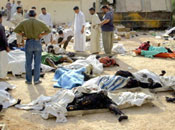Iraq Fiasco and the Withdrawal Paradox
 |
| 17 July 2005: Scores of bodies lying outside the morgue of a local hospital in the Al-Musayyib town, about 37 miles south of Baghdad. The dead are victims of a suicide bomber that killed at least 60 people and wounded 85 in a massive fireball when he blew himself up next to a liquefied gas tanker. |
From Friday through Sunday, Iraq was hit by an unbelievable 15 suicide bombings, one of which, on a Shi'a mosque in Musayyib, killed 98 people. Since the April 28 formation of the new government, car bombings alone have killed close to 1700. Since the United States has a population at least 11 times that of Iraq, this is proportionately something like 6 9/11's that Iraqis have gone through in just the past few months - without even counting deaths, injuries, and torture inflicted by U.S. and Iraqi government forces. According to a justification George Bush gives now and again, this was a deliberate goal of the invasion and these 6 9/11's count as a stunning success of the policy.
This week, Seymour Hersh reports that, according to anonymous military and intelligence sources, during the run-up to the Iraqi elections, George Bush signed a "highly classified Presidential 'finding' authorizing the C.I.A. to provide money and other support covertly to political candidates in certain countries who, in the Administration's view, were seeking to spread democracy." The context in which this finding was made was Iraq and the political candidate who was supposedly "seeking to spread democracy," was none other than the Paul Bremer-appointed strongman Ayad Allawi, whose democratic record includes general thuggery, vicious crackdowns from the Iraqi security forces, attempts to intimidate and suppress the media, and approval of the murderous assault on Fallujah in November - although it's true he has shown no less respect for democracy than his successors.
It's harder and harder for anyone to justify any aspect of the Iraq war unless, like most of the right wing, he takes the position that facts don't matter or, really, don't exist. You simply can't argue that Iraqis are better off - the violence far exceeds that of Saddam's later years, unofficial militias intimidate everyone and restrict basic political freedoms almost as much as Saddam did, and, indeed many basic rights that Saddam guaranteed, especially women's rights, are gone now.
You also can't argue that the United States wanted any real democracy in Iraq. The presidential finding may or may not have been fully implemented and it certainly made little difference - Allawi's list only got 14% even in the official figures - but the intent to manipulate the election was there. And even the election itself represented a capitulation to Ayatollah Sistani, not any American plan.
You get the point. And yet, this same week, Jay Bookman, deputy editorial page editor of the Atlanta Journal-Constitution, wrote an opinion piece in which he excoriates the Iraq war as an absolute fiasco but says we can't just leave, that we're "morally obligated" to stay until the Iraqis can elect a government and establish a "means of self-defense."
This would mean little - it is, after all, the conventional view - but Jay Bookman is the same man who wrote, in the fall of 2002, that the reason for the impending Iraq war was dreams of a new militaristic American empire and referenced the plans of the Project for a New American Century, at the time largely unknown but now a staple of left analysis.
Now add to all of this the analysis developed over the last few weeks in these commentaries, that the Iraq war is now significantly weakening American imperial hegemony, directly through bogging it down and consuming the administration's attention, and indirectly through hastening the collapse of the international legitimacy of America's role.
You have a picture of a war that's not helping anyone, except, of course, the very people Bush swore eternal enmity against after 9/11, that neither hard-headed realists who care only about American power or American soldiers' lives nor bleeding hearts who are willing to make sacrifices if it's for the good of Iraqis can seriously support. And yet the antiwar movement is silent, nobody is coming to us to say, "You were right all along, please tell us what to do now," and, most critically, even people with penetration, open minds, and basic good will like Jay Bookman don't support withdrawal. Talk about immediate withdrawal and meaningful support is negligible - the question isn't even asked on polls. This situation is, or ought to be, a tremendous paradox.
Rahul Mahajan is publisher of the blog Empire Notes and teaches at New York University. He has been to Iraq twice and reported from Fallujah during the siege in April.
Related Suggestions
Here is a taste of US freedom and democracy:
http://www.infowars.com/print/iraq/sodomized.htm

















